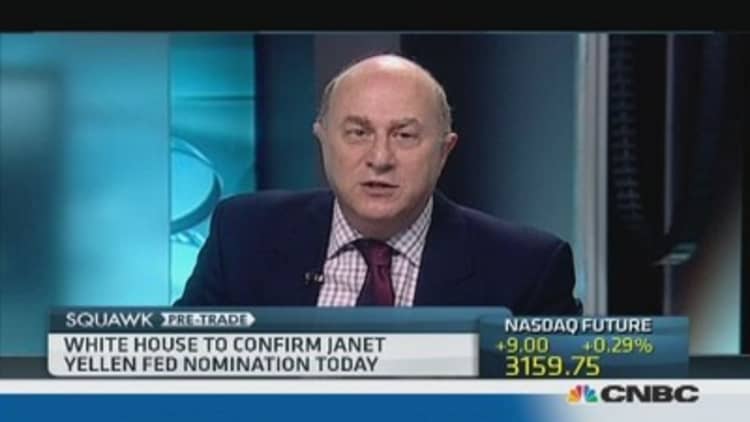The expected appointment of Janet Yellen as chair of the U.S. Federal Reserve, the world's most powerful central bank, will have reverberations around the world.
She may have been given the job with the remit to sort out the domestic economy, but as the person with the most influence over the world's biggest economy, every pronouncement she makes on monetary policy has the power to move markets.
"As the major central bank of the globe, any decision they take has spill overs to other advanced economies, to emerging market economies," ECB Executive Board Member Joerg Asmussen pointed out in an exclusive interview with CNBC Wednesday.
(Read more: Asmussen on U.S. monetary policy)

The ECB has taken its lead from the Fed in injecting more money into the financial system to stave off recession through its two blocks of ultra-cheap long-term loans to banks, called long-term refinancing operations (LTROs). There is no reason that the Fed's influence will change with Yellen's appointment.
Yellen is widely expected to continue her dovish position on monetary policy – which has been seen as positive for emerging markets in particular.
Asian stocks rose on Wednesday following the announcement of her imminent appointment.
(Read more: Yellen cheer for markets)
As the current Fed vice chair, Yellen has indicated that she is in favor of maintaining the Fed's bond-buying program, which has been credited with helping the U.S. economy recover from the financial crisis. When it looked as though current Chairman Ben Bernanke was planning to end the program through a "taper" earlier this year, it sent many of the biggest emerging markets' stock markets down and devalued currencies like the Brazilian real.
"With Janet Yellen, you're likely to get a situation where the Fed pursues its ultra-loose monetary policy well beyond the current threshold of unemployment at 6.5 % and ultimately pushes into higher inflation," Gabriel Stein, chief economist of the Official Monetary and Financial Institutions Forum, told CNBC.
He warned that Yellen is more likely than other candidates for the Fed job to "make a mistake" by pursuing lower unemployment at the price of higher inflation, through continuing loose monetary policies like the asset purchase program.
Yellen's perceived dovishness could be counteracted by more"hawkish" members of the Federal Reserve's Open Markets Committee (FOMC) joining in January 2014. The Fed "hawks," like Dallas Federal Reserve Bank President Richard Fisher and Bank of Philadelphia President Charles Plosser, are known to be more in favor of concluding the asset purchasing program because of concerns about inflation.
—By CNBC's Catherine Boyle. Twitter: @cboylecnbc.
Correction:
This version corrected Gabriel Stein title to chief economist of the Official Monetary and Financial Institutions Forum.


